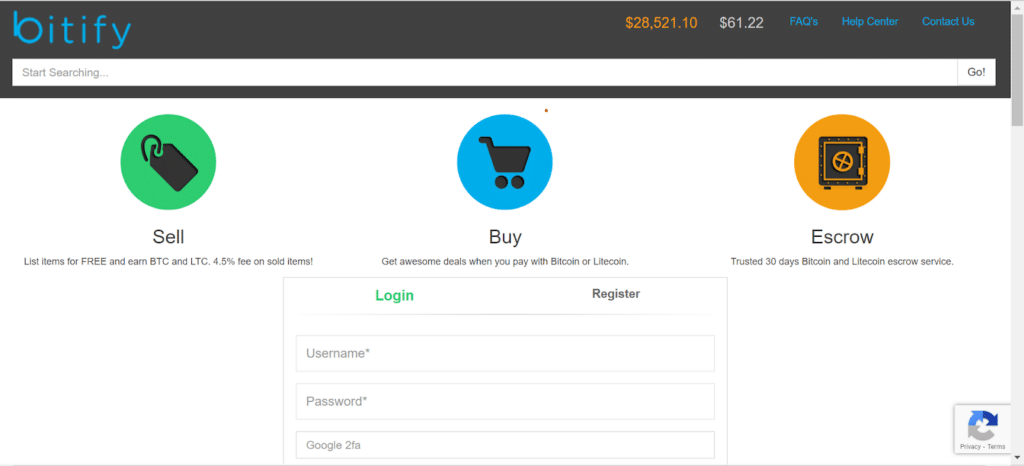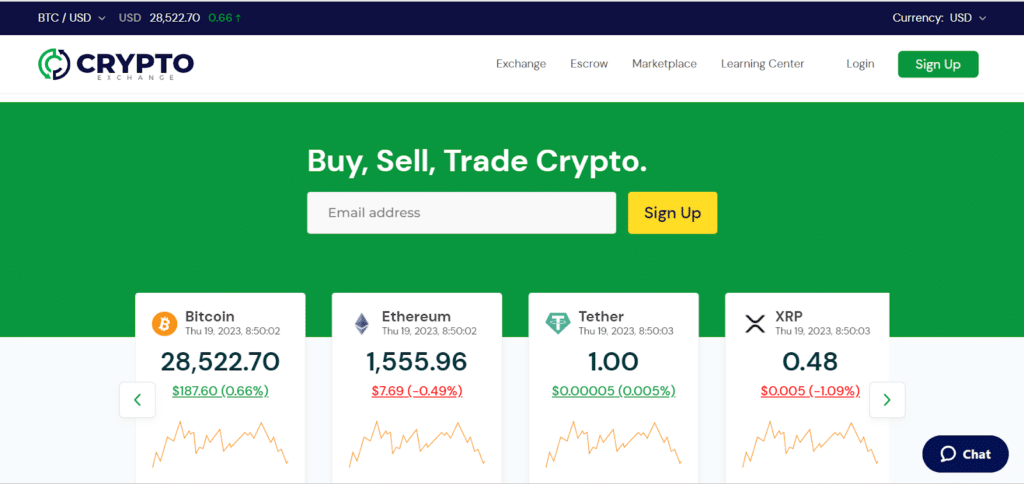Sell Items For Bitcoins: Top Crypto Platforms For Online Trading

This article explores how to earn cryptocurrency by selling physical or digital products online and which platforms can help in that endeavor.
Read on as we examine a wide range of platforms and methods that could help users earn Bitcoin (BTC) and other digital currencies.
How and where to sell items for Bitcoins
In today’s fast-changing digital world, online shopping is booming, making e-commerce one of the hottest markets worldwide. More people are choosing the ease and accessibility of shopping online, opening up doors for anyone with something to sell. Explore the practical side of selling goods for Bitcoins as we guide you through the expanding realm of cryptocurrency commerce in online retail.
Why sell stuff for bitcoins? Pros and cons
Selling items in exchange for Bitcoin could be beneficial for a number of reasons, depending on the seller’s circumstances and goals.
Pros
- Decentralization: Bitcoin operates on a decentralized network, which means it’s not controlled by a single entity or government. This could be appealing for those who would rather avoid centralized financial systems.
- Low transaction fees: Bitcoin transactions often have lower fees compared to traditional payment methods, especially for international transfers.
- Security: Bitcoin transactions are highly secure due to the blockchain technology, making it difficult for fraud or unauthorized access.
- Anonymity: While Bitcoin transactions are not entirely anonymous, they offer a level of privacy that may be desirable for some.
- Global reach: Bitcoin has a global presence, making it easy to engage in international trade without worrying about complications like currency exchange rates.
Cons
Sure, selling items for Bitcoin does come with its share of drawbacks:
- Volatility: Bitcoin’s value can swing dramatically, so the amount received for a sale might be worth much less when converted to fiat currency. This uncertainty can make financial planning tricky for sellers.
- Limited adoption: While Bitcoin is gaining traction, it’s not universally embraced like traditional currency. This means sellers might have a smaller pool of potential buyers compared to if they accepted regular money.
- Regulatory uncertainty: The rules and regulations around cryptocurrencies are still being defined in many places. Sellers could face legal challenges or compliance issues as a result, adding complexity and risk to their business operations.
- Technical hurdles: Dealing with Bitcoin requires a certain level of tech know-how, which not all sellers or buyers possess. This could create barriers to entry for some customers, potentially limiting sales opportunities.
Despite these challenges, many sellers find value in accepting Bitcoin as a payment method. It’s all about weighing the pros and cons and deciding what makes the most sense for your business.
How to sell stuff for Bitcoin
Once you’ve made the decision to sell items for bitcoins, here’s your next step guide:
- Create a Bitcoin wallet. There are several types of Bitcoin wallets, including software wallets, hardware wallets, and paper wallets. Aspiring sellers should thoroughly research all of them and decide which is most suitable for their needs. Once this is done, they can download the wallet software onto their device and create a new wallet.
- Decide what to sell. Aspiring sellers should decide what items or services they want to exchange for Bitcoin. This could be physical products, digital goods, services, or even their time and expertise.
- Set a price in Bitcoin. Determine the price of the chosen items or services in Bitcoin. This can be done by converting the item’s value from the seller’s local currency to Bitcoin based on the current exchange rate.
- Make a listing. Create a listing on a platform that accepts Bitcoin as payment. Sellers should include their Bitcoin wallet address so the buyer knows where to send the payment. It’s important to double-check the accuracy of this address, as Bitcoin transactions are irreversible.
- Agree on terms. If you’re selling a service or arranging a more complex transaction, clearly define the terms and conditions. This might include delivery or fulfillment details, return policies, etc.
- Complete the sale. Once a buyer expresses interest and agrees to your terms, they will send the agreed-upon amount of Bitcoin to your wallet address. Ensure you have received the payment before proceeding with the delivery of the item or service.
- Fulfill the order. If you’re selling physical items, package and ship the product to the buyer. If it’s a digital item or a service, provide the agreed-upon service or deliver the digital product.
- Consider taxes and regulations. Some countries consider cryptocurrency transactions taxable. Sellers should be sure to research the regulations in their jurisdiction and report their earnings if necessary. Keeping records of all Bitcoin transactions, including the date, amount, and the items or services sold will help with accounting and tax reporting.
- Stay informed. The cryptocurrency market is dynamic, and Bitcoin’s value can be volatile. Sellers should ensure they are informed about the latest developments, regulations, and exchange rates to make informed decisions.
Crypto marketplace for selling items
There are several online platforms where you can sell items for crypto like Bitcoin. These bitcoin marketplaces provide a convenient way to engage in buying and selling transactions using cryptocurrencies. Here are a few popular ones.
Bitify

Bitify describes itself as a “Bitcoin and Litecoin Marketplace and Auction Site”. It is a mix of Amazon and eBay in the sense that users can sell products directly or use an auction-style approach.
On Bitify, you can sell digital products, such as eBooks and software, as well as physical products, such as clothes and books. In addition, the platform offers an escrow service for increased payment security and to ensure the delivery of purchased goods.
While product listings are free, sellers are charged a 4.5% fee while buyers are charged up to $1 for purchases up to $20 when escrow is used. Beyond that, there are no buyer fees.
Bitify has been around since 2013 and has over 165,000 users, meaning that sellers immediately have a potential client base ready to buy their products.
BitcoinTalk

Created by Bitcoin founder Satoshi Nakamoto, BitcoinTalk is an open platform for discussions about blockchain, developers, and cryptocurrency investors. They engage in conversations related to Bitcoin, cryptocurrencies, and the broader blockchain ecosystem.
BitcoinTalk was constructed using an open-source software package called Simple Machine Forum (SMF). The forum’s design and functionality have remained largely unaltered since its initial release.
The platform has a number of forums and sub-forums. This includes the marketplace forum where users can trade goods, services, and other currencies for Bitcoin. Transactions are carried out between the users so the terms can vary from one exchange to another.
Crypto Exchange

Crypto Exchange states that it aims to become “the go-to exchange to trade cryptocurrencies”, providing a variety of products users can purchase and sell items on its marketplace, from watches to cars to real estate in exchange for cryptocurrency, as well as store and trade their digital currency.
As well as connecting buyers and sellers, Crypto Exchange’s marketplace gives its users access to dedicated escrow services. Escrow officers secure the transferred funds and ensure the agreement’s terms are met.
Accepting Bitcoin at an online shop
Sellers with an online shop can decide to accept Bitcoin or other digital currencies as a payment method. Online shops can be set up using platforms like Shopify, which has a cryptocurrency payment option, or by accepting digital currencies through merchant payment providers such as BitPay, Coinbase, or BTCPay. For existing online retailers, accepting cryptocurrencies as a payment method could help boost sales due to exposure to a new client base. Moreover, it is a convenient way for anyone interested in exploring cryptocurrencies to get into them, should one decide to accept it directly as opposed to immediately converting it into fiat currency.
Conclusion
The world of e-commerce is still continuing to expand, and it’s clear cryptocurrencies have a role to play in this expansion. As we’ve explored in this article, there are several crypto platforms that have emerged as reliable avenues for individuals looking to sell stuff for bitcoins. These platforms offer a variety of benefits, including security, low transaction fees, and access to a global market.
However, it’s crucial to approach online trading with caution. Always conduct thorough research and due diligence before using any platform to ensure that it aligns with your needs and preferences. Keep in mind that the cryptocurrency market can be highly volatile, so be prepared for potential price fluctuations.
FAQs
What type of items can I sell for bitcoins?
You can sell a wide range of items for bitcoins, including physical products, digital goods,
services, and even your time and expertise. Whether you’re offering handmade crafts, digital downloads, freelance services, or consulting advice, there’s a market for various goods and services in exchange for bitcoins.
What’s the best way to sell digital goods for Вitcoin?
There are a few ways to exchange digital goods in exchange for Bitcoin. Perhaps the most straightforward one is to find an online marketplace that accepts Bitcoin as a payment option. However, you can find independent sellers and buyers on social media networks like Facebook or local marketplaces. If buyers are interested in purchasing goods for Bitcoins, you can contact them directly and discuss the terms.
Is it safe to sell items for crypto?
To sell items for cryptocurrency, such as Bitcoin, can be safe, but it also comes with its own set of risks and considerations, such as price volatility and regulatory restrictions. Whether it’s safe or not depends on various factors, including the specific circumstances, the precautions you take, and your awareness of potential risks.
How do I receive payments in bitcoins for sold items?
To receive payments in bitcoins for sold items, you’ll need to provide your Bitcoin wallet address to the buyer. Once the buyer agrees to purchase your item and sends the payment to your wallet address, the transaction is recorded on the Bitcoin blockchain, and the bitcoins are transferred to your wallet. You can then access and manage your bitcoins through your wallet provider.
Are there any fees associated with selling items for bitcoins?
While fees may vary depending on the platform or method you use to sell items for bitcoins, there are typically minimal fees compared to traditional payment methods. Some platforms may charge a small transaction fee or commission for facilitating the sale, while others may offer free listings with optional premium features for a fee. Additionally, you may incur network transaction fees when transferring bitcoins from your wallet to an exchange or converting them to fiat currency. It’s essential to research and understand the fee structure of the platform or service you choose to use for selling items for bitcoins.
Сan I sell stuff on Amazon for Вitcoins?
As of May 2024, Amazon did not directly support Bitcoin or other cryptocurrencies as payment methods for sellers. The e-commerce giant has its own payment system, and it primarily uses traditional fiat currencies for transactions.
Crypto Firms Push Into US Banking
America’s cryptocurrency companies are scrambling to secure a foothold in the country’s traditional banking system, ... Read more
Ether Surges 16% Amid Speculation Of US ETF Approval
New York, USA – Ether, the second-largest cryptocurrency by market capitalization, experienced a significant surge of ... Read more
BlackRock And The Institutional Embrace Of Bitcoin
BlackRock’s strategic shift towards becoming the world’s largest Bitcoin fund marks a pivotal moment in the financia... Read more
Robinhood Faces Regulatory Scrutiny: SEC Threatens Lawsuit Over Crypto Business
Robinhood, the prominent retail brokerage platform, finds itself in the regulatory spotlight as the Securities and Excha... Read more
Ethereum Price Holds Five-year Range As Breakdown Risk Points To $950
The current Ethereum price is within a long-term five-year range and positioned below key volume levels, increasing the ... Read more
400 Million Coins Left: BlockDAGs $0.0005 Entry Price Is About To Vanish Forever
BlockDAG is entering its final presale hours at a fixed price of $0.0005, with only 400 million coins remaining before p... Read more

